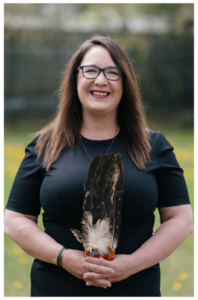ONWA launches campaign to educate public about human trafficking
Trigger warning: readers may be triggered by the mention of human trafficking. To access a 24-hour Canadian Human Trafficking Hotline, call: 1-833-900-1010. Community Assistance Program (CAP) can be accessed for citizens of the Anishinabek Nation: 1-800-663-1142.

By Sam Laskaris
THUNDER BAY – Representatives with the Ontario Native Women’s Association (ONWA) have some new ways to get their messaging out.
The association launched a campaign on Feb. 22 titled, Educate yourself, Educate Others.
The campaign, urging Canadians to learn more about human trafficking, was purposely started on the National Awareness Day for Human Trafficking, which has been observed across the country since 2020.
Ontario had its own Human Trafficking Awareness Day a year earlier.
The new campaign, which will continue until Mar. 30, will include messaging via traditional billboards and digital billboards in various locations across the provinces, as well as posters on Toronto and Ottawa transit systems.
The messaging will allow anybody with a smartphone to scan a QR code and be connected to ONWA’s human trafficking resource page, which can be viewed here.
The new campaign will also include messaging on ONWA’s website and its social media accounts including Facebook, Twitter, Instagram, LinkedIn, and YouTube.
“This is an issue that has been around for generations,” ONWA executive director Cora McGuire-Cyrette said of human trafficking. “And the public is just becoming aware of it now.”
McGuire-Cyrette said plenty of education still needs to be done on the issue.
“Women and girls are being exploited,” she said. “And there’s a misconception that women and girls choose to do this.”
Some progress, however, is being made. Since the beginning of April of 2022, McGuirre-Cyrette said a total of 426 Indigenous girls and women in the province had escaped from human trafficking.
“This is the scary part though,” McGuire-Cyrette said. “We know that this is only the ones who have been able to reach out [and escape].”
As part of the OWNA’s new campaign, traditional billboards have been placed in cities throughout the province, primarily where the association has offices. These locations are Petawawa, Kingston, Cornwall, Belleville/Quinte West, Orillia, Owen Sound, Hanover, Windsor, Chatham-Kent, Greater Sudbury, North Bay, and Sault Ste Marie.
Meanwhile, there are 40 digital billboards placed throughout the country’s most populous city, Toronto. Digital billboards can also be found in Ottawa, Hamilton, St. Catharines, and the three cities in the regional municipality of Waterloo (Cambridge, Kitchener and Waterloo).
Jennifer Richardson, the ONWA’s senior director of strategy and communications, said human trafficking and sexual exploitation are happening in every community in Ontario.
“Everyone needs to know the signs, so they can be part of the solution,” said Richardson, who is a survivor of human trafficking herself.
Richardson is confident the Educate yourself, Educate Others campaign will be considered a success.
“The message is designed to be geared towards the general public and for those who are being trafficked,” she said.
Richardson said she believes human trafficking awareness will be raised especially since studies have proven that posters on transit systems are extremely well-read.
Though she’s only been working with the ONWA for a short time, Richardson has 23 years of experience working in the anti-human trafficking sector.
She had a key role with Ontario’s provincial anti-human trafficking co-ordination office from its inception in 2016 until this past year.

